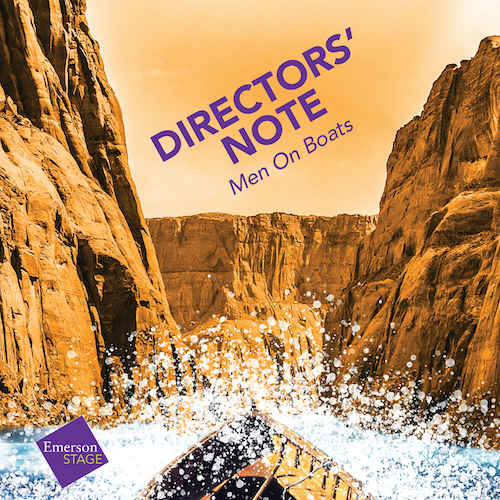MEN ON BOATS | Directors’ Note
Men on Boats is about a trip into the unknown, much like we’re all experiencing today. The journey is dangerous; the outcome doubtful. But the explorers are full of hope, at least until the river gets the best of some of them, when their fears overtake their convictions.
We originally chose and conceived this play over a year ago for the stage. Re-envisioning this action-packed story for an online platform has been a wild process, education, and collaboration into new territory. Since casting the actors last March, we’ve worked entirely remotely, lost three actors who took leaves of absence or were too far away to “reach” with our technology (China), re-cast and rehearsed entirely in Zoom for the first three weeks of our process, and just days ago moved to our live-streaming platform, vMix. We’ve never been in a room together because of COVID-19. We have been truly “distanced,” working at first from different cities, states and continents, and more recently from different rooms and buildings on the same campus here in Boston. Our very notion of what theatre “is” has been challenged. Can we really be what we think of as “live” online? Can we maintain our sense of community and collaboration with each other, our bonds with our audience, re-create the electricity that we know can take place in the air, “live,” between performers and audience from a platform stage—with home viewers on a Transmedia platform?
We wonder. And as we wonder, we work on this play about ten “men who dared,” (as the 1960 movie version put it) to explore the Grand Canyon. We hear in the dialogue their hopes and fears, and their words resonate with our own experience today as we see them bond with each other through dangerous times, build a community together, rely on each other for their health and survival. We also see them revel in each others’ company, and we remember and long for those nights after rehearsals and opening nights when our community gathered, in green rooms and bars, to celebrate the fact that we’d ended the night well, opened the play, engaged in this act of faith called theatre and “come through,” as these men on boats say, after having navigated the most treacherous of rapids.
But the resonances do not stop there. In Backhaus’ language we hear snatches of slang and idioms from our own world and time. This is a “period” play about an actual historical event, but it’s not. It’s not a biopic. It’s a contemporary play in which Backhaus uses this his-tory to question and critique closely-held “mythologies” around gender and power, dangerous assumptions and beliefs that are foundational to acts of systemic oppression and suppression, racism, sexism, and violence. For all of their valor, Backhaus’ “men on boats” are products of their time, shedding light on our own time.
Regarding gender, the playwright makes the casting of this play a condition of producing it: She writes, “The characters in Men On Boats were historically cisgender white males. The cast should be made up entirely of people who are not. I’m talking about racially diverse actors who are female-identifying, trans-identifying, gender fluid, and/or non-gender-conforming.” With this proviso, Backhaus flips the script that history has written, erasing historically cisgender white males from the narratives they wrote to glorify themselves by demanding that these men be represented in her play by a cast of contemporary performers who are not cisgender white males. She effectively “erases” those men, just as they erased the “others” in their histories. Backhaus also shines a contemporary, critical light on the ways white men’s histories became unsettlingly and falsely “our” histories.
As for mythologies of power, Backhaus critiques “American Exceptionalism” and “Manifest Destiny,” two “doctrines” based in white supremacy, fueled by nationalism and capitalism.
In an early scene in Men on Boats, Powell’s crew discovers a stone marker and some artifacts that identify a party of explorers that navigated these rivers decades before them. They are shocked and dismayed to learn they are not the “first” to ride these rapids, that other white men, Native Americans, “prisoners on the lam,” perhaps even indigenous women preceded them. These men’s desire to be “first” speaks to the myth of “American Exceptionalism,” the belief that America is unique, extraordinary, superior in some way to other countries. These characters believe, or want to believe, that their efforts are superior to the unnamed and unknown explorers before them, whom they consider “lesser” because they were not educated, wealthy, white, or male, essentially not them, not “government-sponsored,” as they are.
Consistent with commonly held beliefs in its time, John Wesley Powell’s expedition is also an example of the doctrine of “Manifest Destiny” in action. Starting with President James K. Polk in the 1840’s, this belief that the expansion of the U.S. throughout the American continents was both justified and inevitable, indeed ordained by God,
was popularized by journalists and politicians and then realized by armies, settlers, industrialists and opportunists who pushed westward, fueling western settlement, taking Native American lives and lands, forcing those who survived onto reservations.
In Men on Boats, the Powell party’s encounter with the Ute Chief Tsauwiat and his wife, The Bishop, as written by Backhaus in a Dave-Chappelle-like style, both mocks and challenges the assumptions and aggression that whites inflicted on Native Americans. This scene is “located” in its historical context, but it could just as easily be read as a contemporary exchange between whites and those they have systemically oppressed today; Black people, immigrants, women, and many “others,” with the “others” in Backhaus’ play having their say. The playwright clearly establishes these Ute leaders as more intelligent, more generous, and morally superior to the whites who stereotype them. Backhaus endows high status on the Chief and The Bishop, empowering them to respond to their so-called superiors, the privileged white men who have come looking for a favor, with sarcasm, innuendo, and anger.
For all of its serious substance, ultimately Men on Boats is a comedy which, in a classic sense, is concerned with humans as social beings; its function is corrective. While they amuse and entertain, comedies like Men on Boats also critique social institutions and ridicule them through satirizing and parodying them, often exposing the darker sides of our human nature. They are dramatic “agents of change.” “The truth,” American critic and director Harold Clurman wrote, “is like castor oil. It’s difficult to take and hard to swallow, so we get them laughing and while their mouths are open, we pour it in.”
—Maureen Shea, Sarah Hickler, and Lucy Kania

